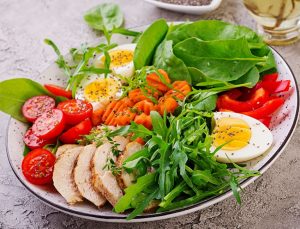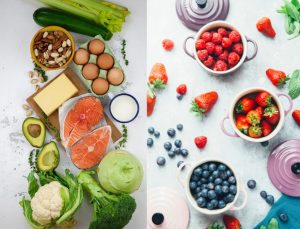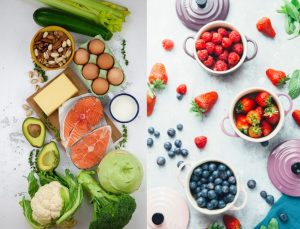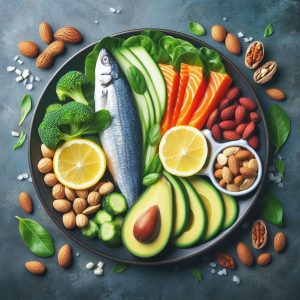The ketogenic or “keto” diet has become an extremely popular way to lose weight and improve health. It focuses on eating foods that are very low in carbs, high in fat, and moderate in protein. This combination puts your body into a metabolic state called ketosis, where fat becomes the main source of fuel instead of carbs.
The keto diet was originally used to treat epilepsy in children, but it has gained popularity more recently for weight loss and type 2 diabetes. Research shows the keto diet may improve heart health, blood sugar control, brain function, and much more.
However, the keto diet is very restrictive and not easy to follow long-term. It’s important to know which foods to eat, limit, and avoid altogether. This comprehensive keto diet food list covers everything you need to know.

Foods to Eat on Keto
Here are the main categories of foods that you’ll be eating on the keto diet. These options are low in carbs but high in healthy fats and protein.
Fatty Fish and Seafood
Fatty fish like salmon, mackerel, sardines and trout are staples on the keto diet. They contain omega-3 fats, high-quality protein, vitamins and minerals.
Aim for at least two 3.5-ounce servings per week. Options include salmon, trout, tuna, sardines, mackerel, herring and anchovies.
Shellfish like shrimp, clams, mussels, oysters and scallops are also great choices. They’re highly nutritious and low in carbs.
Canned fish like tuna and salmon are convenient options that make a great portable keto snack.
Meat and Poultry
Fresh or frozen beef, pork, lamb, chicken and turkey are all allowed on keto. Go for fattier cuts if possible.
Try adding beef tallow, lard, duck fat or marrow bones to veggies to increase the fat content of meals. Organ meats like liver are also high in cholesterol and valuable nutrients.
Processed meats like bacon, sausage, pepperoni, salami and hot dogs can also be part of a keto diet but should be eaten occasionally due to their high sodium content.
Eggs
Eggs are a nutritional powerhouse. Studies show that eating eggs may promote weight loss, improve heart health markers, and stabilize blood sugar levels.
Egg yolks are especially nutritious – they contain vitamin D, zinc, and choline, a nutrient not many people get enough of.
Aim for whole eggs instead of only egg whites. The fat and cholesterol in the yolks are important on keto.

Non-Starchy Vegetables
All vegetables contain carbs, but some contain very few digestible carbs. These are called non-starchy vegetables and are great for keto.
Options include:
- Leafy greens – spinach, kale, lettuce, chard, collards
- Cruciferous veggies – broccoli, cauliflower, cabbage, Brussels sprouts
- Asparagus
- Cucumbers
- Peppers
- Celery
- Mushrooms
Load up on these low-carb veggies. They’re high in fiber, vitamin C, b vitamins, potassium, and other nutrients.
High-Fat Dairy
Butter, sour cream, heavy whipping cream and most cheeses are very low in carbs. Be sure to choose full-fat options.
Greek yogurt and cottage cheese contain a bit more carbs. Stick to 1/2 cup per day of these.
Aged, hard cheeses like cheddar, Swiss, Parmesan and Pecorino Romano have nearly zero digestible carbs. Softer cheeses and shredded cheese may have added carbs or starches.
Nuts and Seeds
Almonds, pecans, walnuts, macadamia nuts, pumpkin seeds, chia seeds and flaxseeds are great keto-friendly snacks.
Nut butters like peanut, almond and cashew butter are also allowed on keto. Always choose natural nut butters without added sugars.
Limit portion sizes of nuts and nut butters to about 1 ounce per day to avoid excess calories.
Oils and Fats
Olive oil, avocado oil, coconut oil, nut oils, butter, lard and tallow provide the healthy fats essential to keto success.
Consume at least 2-4 tablespoons per day. Using these oils and fats for cooking can also add extra fat and flavor to meals.
Berries
Because they are relatively low in carbs, berries like strawberries, blueberries, raspberries and blackberries can be enjoyed occasionally on keto.
Berries are rich in antioxidants and can be topped with whipped cream for a sweet, low-carb dessert. Just be mindful of portions, as carbs can add up quickly.
Plain Greek Yogurt
Choose plain, full-fat Greek yogurt. Avoid flavored yogurts with added sugars.
Add berries, chia seeds, walnuts, cinnamon or cocoa powder to make a delicious keto breakfast or parfait. Limit to 6 ounces or less per day.
Cottage Cheese
Plain cottage cheese provides an excellent source of protein on keto. Keep portions to 1/2 cup or less per day.
Top with avocado, olive oil, nuts, seeds or berries to add more healthy fats.
Coffee and Tea
Coffee and tea are great low or zero-carb drinks to include on keto.
Add a splash of heavy cream or MCT oil to coffee for a fat and energy boost. Avoid sweeteners like sugar or artificial sweeteners.
Herbal teas like chamomile, peppermint and green tea can satisfy a sweet craving, just avoid added sugars.
Foods to Limit on Keto
Certain foods are allowed on keto but need to be limited due to their higher carbohydrate counts. Here are the main foods to watch your portions with:
Dairy Milk
Milk contains 12 grams of carbs per 1 cup, so it’s not keto food -friendly in large amounts.
However, small amounts of milk can be added to coffee or tea on occasion if needed. Focus on sticking with fattier dairy products.
Beans and Legumes
Beans, lentils, peas and chickpeas are too high in carbs to include in large amounts on keto.
However, around 1/4 to 1/2 cup portions a few times per week may be okay if it fits within your daily carb limit. Focus on green varieties like green beans and edamame.
Nuts and Nut Butters
Nuts and seeds are very healthy, but they do contain a fair amount of carbs. Track your portions to stick within 1 oz daily limits.
Nut butters are easy to overeat, so measure out 1-2 tablespoon servings instead of scooping from the jar.

Alcohol
Dry wines, champagne, and pure forms of alcohol like whiskey, vodka, gin and tequila are allowed in moderation on keto.
Aim for 1-2 servings 2-3 times per week at most. Avoid beer, sweet wines and mixed cocktails high in carbs and sugar.
Artificial Sweeteners
Small amounts of artificial sweeteners like erythritol, stevia, aspartame and sucralose may be okay for some people on keto. However, avoid baking with these.
If you have digestive issues, artificial sweeteners and diet products could stall weight loss. It’s best to minimize intake.
Low-Carb Swaps
While gluten-free baked goods, keto desserts, protein bars and processed snacks labeled as “low carb” or “keto-friendly” are allowed on keto, they should not be the main source of your daily calories. These provide minimal nutrition and contain additives.
Foods to Avoid on Keto
To stay in ketosis, there are some foods that need to be eliminated altogether on keto:
Grains
Grains including wheat, corn, rice, cereal, pasta, and any grain-based flours or products. Breads, pasta, cereals, pancakes, biscuits, pizza, tortillas.
Starchy Vegetables
Higher carb veggies like potatoes, sweet potatoes/yams, peas, parsnips, winter squash, beets, carrots.
Legumes
All beans (besides green beans), lentils, peas, chickpeas.
Fruits
Higher sugar fruits like bananas, oranges, apples, grapes, mangoes, pears, pineapple.
Sweeteners
Table sugar, maple syrup, agave, honey.
Sugary Foods
Soda, juice, sports drinks, cake, cookies, ice cream, milk chocolate, candies, muffins, smoothies.
Processed Snacks and Foods
Chips, pretzels, crackers, breakfast cereals, granola bars, baked goods, pizza, fast food.
Condiments and Sauces
Barbecue sauce, sweet chili sauce, ketchup, balsamic vinaigrette, teriyaki sauce.
Alcoholic Drinks
Beer, cider, sweet wines, cocktails, mixed alcoholic beverages.
High-Carb Dairy
Chocolate milk, flavored yogurts, sweetened cheeses.
Other
Processed low-carb or “diet” food products, like shakes, bars, desserts, keto ice cream and sweets.
Sample Keto Meal Plan
Here is a sample one day meal plan and foods to eat on keto:
Breakfast
- Scrambled eggs with sautéed spinach, mushrooms and cheese
- Avocado
- Black coffee
Lunch
- Tuna salad made with avocado mayo
- Raw veggies with ranch dip
- Raspberries
Snack
- 1 oz pecans
- Plain Greek yogurt with cinnamon and walnuts
Dinner
- Grilled chicken breast
- Zucchini noodles with Alfredo sauce
- Side salad with olive oil dressing
Dessert
- 90% dark chocolate square
- Strawberries with whipped cream
10 Best Foods for Keto Success
Focus on including more of these keto all-star foods for best results:
- Fatty fish (salmon, sardines)
- Avocados
- Non-starchy veggies
- Eggs
- Olive oil or coconut oil
- Grass-fed butter
- Nuts and seeds
- Plain Greek yogurt
- Chicken and turkey
- Leafy greens
Tips for Starting Keto
Switching to a ketogenic diet can be challenging but worthwhile for many people. Here are some tips to get started:
- Gradually reduce carbs over a few weeks leading up to keto
- Stay under 20-50 g net carbs daily
- Prioritize high-fat, low-carb whole foods
- Drink lots of water
- Supplement electrolytes
- Expect some transition side effects
- Plan out meals and snacks
- Track what you eat using an app
- Get support from forums and Facebook groups
Within a few weeks, your body should adjust to burning fat instead of carbs for fuel and the keto flu side effects should subside. At that point, the keto diet may feel easy and natural.

Potential Benefits of Keto
Research suggests the keto diet may provide these benefits:
Weight Loss
Several studies show that keto is more effective for fat loss and weight reduction compared to low-fat diets. Eating fat helps promote satiety as well. However, results also depend on overall calorie intake.
Heart Health
The high-fat keto diet may improve cholesterol levels, raise HDL (good) cholesterol, lower triglycerides, lower blood pressure and reduce oxidative stress and inflammation in the body – all of which support heart health.
Blood Sugar Control
For people with diabetes, prediabetes or insulin resistance, keto can help keep blood sugar stable due to its low carb intake. Multiple studies find keto improves hemoglobin A1C and fasting blood glucose levels compared to higher carb diets.
Mental Focus and Clarity
Some research shows keto may provide mental clarity, focus, and improved cognition for those with conditions like Alzheimer’s or Parkinson’s Disease. Brain fog symptoms are also commonly reduced.
Seizure Reduction
The keto diet originated as a clinical tool to reduce epileptic seizures, especially in children. It remains an effective therapeutic diet for epilepsy today.
However, the impacts of long term keto are still unknown. More research is needed on its effects for other conditions beyond epilepsy.
Potential Drawbacks of Keto
The keto diet also comes with some potential cons to be aware of:
Keto Flu
When transitioning to keto, side effects like fatigue, headaches, nausea and constipation can occur as the body adapts to ketosis. This is nicknamed the “keto flu” and lasts 1-2 weeks.
Drinking enough water, getting electrolytes and eating more fat can help counteract this.
Nutrient Deficiencies
The keto diet eliminates many healthy carb-containing foods, like fruits, starchy vegetables and grains. This makes it possible to miss out on nutrients like vitamin C, magnesium, potassium, folate and fiber.
Taking supplements and eating lots of low-carb veggies can help fill nutrient gaps. Periodic carb refeeds may be beneficial as well.
Dietary Restrictions
Keto restricts the intake of many otherwise healthy foods like fruit, beans, rice, and sweet potatoes. This makes it a difficult diet for some people to adhere to long-term.
Working with a dietitian can help ensure you still eat a variety of nutrient-dense foods alongside keto approved options.
Gut Health & Digestion Issues
Large amounts of fat and animal foods can irritate the gut lining and potentially cause diarrhea, cramping or constipation in some individuals.
Focusing on getting enough fiber, probiotics, bone broths, hydration and phytonutrient-rich foods may help promote good digestion on keto.
Disordered Eating Patterns
For some, keto may promote an unhealthy relationship with food due to its restrictive nature. This could lead to cycles of intense restriction followed by binge eating in some individuals.
Working with a therapist and dietitian can help prevent these risks and make keto more sustainable long-term.
Sustainability Problems
Adhering to under 50 g of carbs daily long-term is extremely difficult. “Falling off the wagon” is easy due to keto’s strict requirements.
Using more flexible versions of keto or taking occasional breaks (“cyclical keto”) can make this diet more sustainable for some people.
Is Keto Right For You?
While the keto diet can be helpful for weight loss and health conditions like type 2 diabetes in the short term, it is difficult to follow forever.
Potential benefits also depend on the quality of your food choices. Eating mostly processed meat and foods high in saturated fat can increase inflammation and chronic disease risk. Focus on getting plenty of micronutrient-rich vegetables, nuts, seeds and plant foods as part of a keto diet.
Working with a doctor and registered dietitian can help determine if keto is a good fit for your health goals, and how to follow it in a balanced, sustainable way.
Key Takeaways
The keto diet is high in fat, very low carb (under 50 g/day) and moderate in protein. It forces the body to burn fats and ketones instead of glucose for fuel.
Foods to enjoy include non-starchy veggies, meat, fish, eggs, olive oil, avocados, nuts, seeds and high-fat dairy. Avoid grains, legumes, starchy vegetables, fruit and sweets.
Potential benefits include weight loss, lower blood sugar levels, mental clarity and reducing seizures. However, the long term impact of keto is unknown. It is also highly restrictive and challenging to adhere to.
Work with a professional to ensure the diet is nutritionally balanced if you try keto. Focus on transitioning gradually, staying hydrated, supplementing, and listening to your body.
FAQS
What is a ketogenic diet?
A ketogenic diet is a low-carb, high-fat diet that has been shown to help burn fat and promote weight loss.
What foods can I eat on the keto diet?
You can eat foods that are low in carbohydrates and high in healthy fats such as avocado, nuts and seeds, meat and poultry, and non-starchy vegetables.
How many carbs can I have on a keto diet?
The number of carbs you can have on a keto diet varies, but it is typically recommended to keep your carb intake below 50 grams per day.
Can I eat berries on the keto diet?
Yes, you can eat berries in moderation on the keto diet as they are lower in carbs compared to other fruits.
What are some keto recipes I can try?
There are many keto recipes available that include low-carb ingredients such as cauliflower rice, zucchini noodles, and almond flour. Some popular keto recipes include keto-friendly pancakes, avocado and egg breakfast muffins, and cauliflower crust pizza.
Can I have coffee and tea on the keto diet?
Yes, you can have coffee and tea on the keto diet, as long as you don’t add sugar or high-carb milk or creamers. Instead, use unsweetened almond milk or heavy cream.
What fats and oils can I use on the keto diet?
You can use healthy fats and oils on the keto diet such as avocado oil, coconut oil, olive oil, butter, and ghee.
What are some keto-friendly nuts and seeds?
Some keto-friendly nuts and seeds include almonds, walnuts, macadamia nuts, chia seeds, and flaxseeds.
Can I eat poultry on the keto diet?
Yes, you can eat poultry such as chicken and turkey on the keto diet, as they are low in carbs and high in protein.
Are there any foods I should avoid on the keto diet?
Yes, you should avoid foods that are high in carbohydrates such as grains, sugars, and processed foods. It is also recommended to limit your intake of fruits and starchy vegetables.
